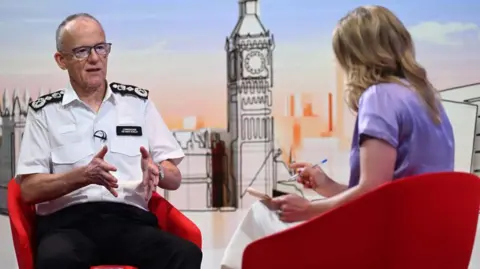The discussion surrounding the cost of policing football matches in the UK has recently gained traction, especially after the remarks made by the Metropolitan Police Commissioner, Sir Mark Rowley. In a notable appeal to the football community, he proposed that football clubs contribute to the staggering £70 million annual cost associated with policing these events. These comments were expressed during an interview on the BBC, underpinning the mounting pressure on police budgets and resources nationwide.
Sir Mark Rowley, recognized as the foremost authority in British policing, articulated a compelling argument during his interview. He questioned why entities hosting events that require extensive policing should not share the financial burden. His perspective centers around a “polluter pays approach,” a principle that suggests those who generate the costs associated with an activity should be responsible for covering them. This pragmatic stance was proposed in light of current funding constraints and the strain faced by local communities who often bear the brunt of such operational expenses.
His call for football clubs to shoulder part of the policing expenses seems increasingly relevant given the broader context of police funding and reform. Rowley is advocating for significant restructuring within the police system, with an emphasis on consolidating smaller forces into larger police entities. He envisions a reduction of the existing 43 police forces across England and Wales to as few as 12 to 15, aiming to enhance efficiency and better allocate resources while adapting to increased public safety demands.
During the interview on “Sunday with Laura Kuenssberg,” Sir Mark elaborated on the limitations of the current model, asserting that it has become outdated and ill-equipped to tackle modern policing challenges. This sentiment echoes after the recent Spending Review, during which Chancellor Rachel Reeves announced only a modest 2.3% funding increase for policing in England and Wales, a figure many within the policing community deem insufficient. Sir Mark’s statements serve to highlight the pressing need for financial support and systemic reforms in the policing landscape, especially as they relate to high-profile activities such as football matches, where security demands remain considerable.
The commissioner pointed out that a significant portion of the £70 million policing bill primarily relates to Premier League games, underscoring the direct connection between the financial viability of football clubs and public safety expenditures. This presents a valid question: why should local communities subsidize the security needs of a lucrative mainstream sport? His suggestion aligns with a growing consensus that those who benefit financially from major events should help cover associated costs, instead of cities and their law enforcement agencies bearing the entire financial load.
However, responding to Rowley’s proposal has not been without controversy. Previous recommendations directed at making football clubs responsible for policing costs have faced backlash from various sports organizations. Critics argue that such financial responsibilities could result in elevated ticket prices and potentially threaten the viability of local events, creating a delicate balancing act between public safety funding and the financial realities of sports management.
Compounding the issue, Sir Mark pointed out systemic inefficiencies within the current police structure, where smaller forces often engage in costly collaborative efforts rather than functioning independently. His vision for larger local police units, complemented by a national body, could streamline operations and minimize waste—a structure he believes could lead to better outcomes for public safety.
As the conversation surrounding these policing reforms unfolds, the reality remains stark: effective public safety spending has gravely diminished over the last decade. Sir Mark’s assertion emphasizes the need for the police to maximize every available pound, and in addressing future crime prevention, he underscored the importance of prioritizing impactful areas of policing while acknowledging the need to scale back in less critical areas, hence stirring a discussion on what crimes might be deprioritized.
The dialogue initiated by Sir Mark Rowley encapsulates the broader debate over public safety, financing, and the responsibilities of financial entities, such as football clubs, in contributing to the communal wellbeing of society. As reforms are considered, these discussions will undoubtedly shape the future of policing in the UK, aiming for a sustainable model that benefits both law enforcement and the public they serve.











